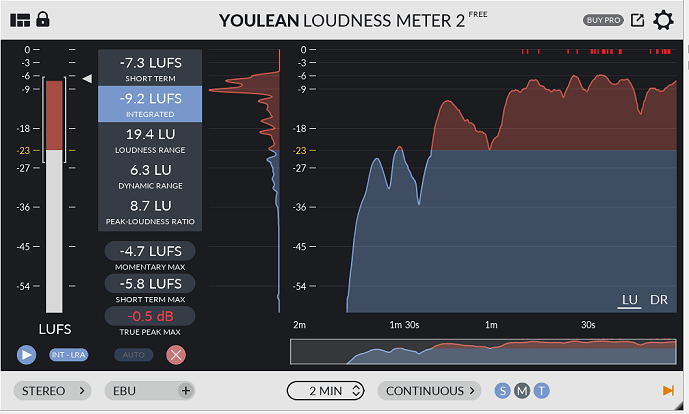I am so bad at gift wrapping. I think I inherited that from my dad, who is not above using cardboard tubes, newspapers and duct tape to get the job done. I failed this evening at wrapping a perfectly rectangular package and had to throw the paper out and start over.
I’m doing a better job with the album mastering…. except, it turns out, I’ve been doing it wrong.
MusicTech magazine’s current issue has a feature about mastering. I read it, and most of the advice is on the order of “use this $4000 worth software and these $3000 monitors” and uh, no thanks. But I did learn that editing the beginning and end of a track is “topping and tailing”, and that electronic music technology magazines in 2018 are pretty much overpriced garbage.
I got more specific, up-to-date advice from the first website that popped up on a Google search. It turns out that in general, you should meter in LUFS (“Loudness Units relative to Full Scale”) for loudness and dBTP (decibels True Peak) for peaks. Nobody thinks you should compress heavily to make your music as loud as possible, because many streaming services normalize everything to the same volume level anyway. And while I was being relatively gentle with my own work compared to the previous album, I was still going beyond recommended levels.

I’d been ignoring metering plugins because there’s nothing more boring than that, and I assumed dbFS peak and RMS as shown in Sound Forge were good enough anyway. But the free version of Youlean Loudness Meter shows the relevant info and how I’m breaking the rules. (-23 LUFS is a European broadcast standard; -14 seems to be a common goal for streaming audio but the important thing there is more “don’t over-compress”). And -1 dBTP is a recommended peak maximum so that MP3 converters don’t accidentally cause clipping.
Of course it would have been smart to do this research before “nearly finishing” all 11 songs. In a lot of cases I think I can just turn it down and be fine, but I’ll double-check I didn’t compress too much.
Sound Forge Pro 10 has been crashing on a semi-regular basis, and it’s a few years old now. I’m happy to see that it’s not abandonware and there is a new version — though Sony (having bought it from Sonic Foundry) sold it to Magix. Unfortunately, the demo crashes immediately on startup. I can use it okay after that as long as I never close the bug reporting window, but it doesn’t say a lot about the potential stability, so I’m not sure I want to pay for an upgrade. Maybe I will look for another tool in the future, though I do like Sound Forge’s dynamics tool and the ease of crossfading every edit.
